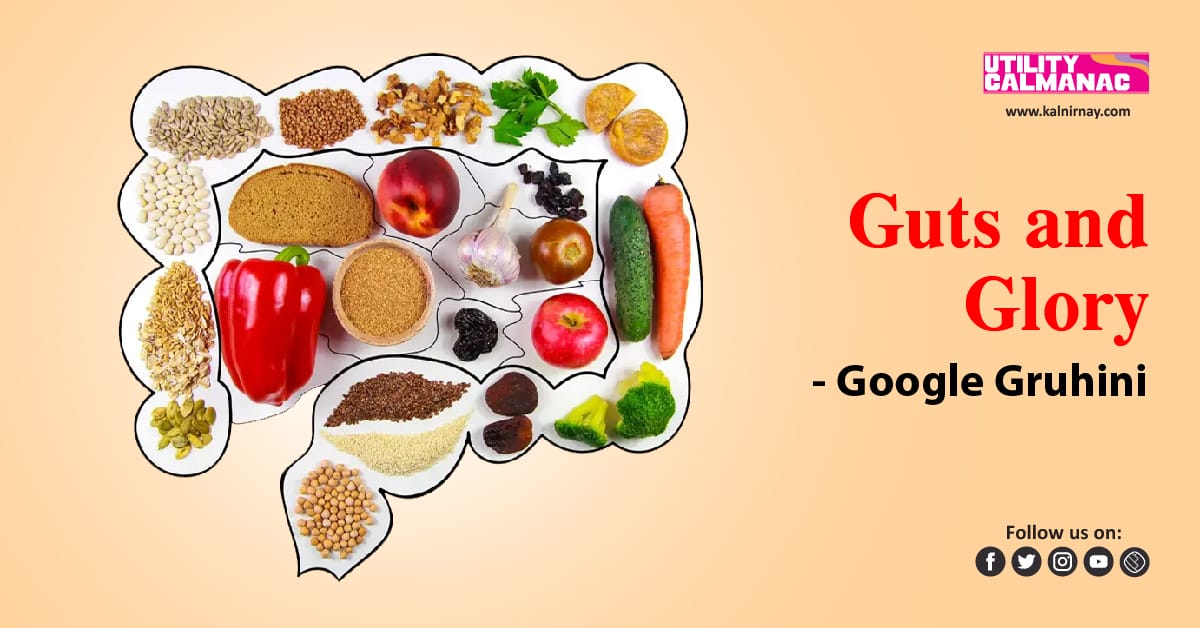Guts and Glory
All you need to know about Gut Health
In 2010, renowned chef Jamie Oliver delivered a compelling lecture on ‘Teach Every Child About Food’ during a ‘TedTalks’ event. This lecture, which garnered immense popularity within the international ‘TED’ network, brought to light a pressing issue in American society. Despite being a global leader in education, technology, and science, the United States has fallen behind in health matters. Shockingly, digestive disorders have emerged as a leading cause of death in the United States, as Oliver highlighted in his lecture.
To underscore his point, Oliver pointed to West Virginia, a state he moved to in 2003. At that time, it held the grim title of the unhealthiest state in America. Obesity and diseases like diabetes and liver failure were rampant among its residents. Upon investigation, it was clear that the shift in dietary habits was taking a toll. Three to four decades ago, the people of West Virginia primarily consumed fresh, locally grown fruits and vegetables. However, with time, the convenience of ‘fast food’ became the norm, especially for working women who found it easier than cooking at home. Oliver discovered that many children in the area had never seen fresh fruits and vegetables because they relied on packaged and processed foods!
To combat this issue, Oliver taught people in schools and public areas how to prepare nutritious and delicious home-cooked meals. He also advocated for nutritious meals in American schools. His relentless efforts pressured fast food companies into accountability. Subsequently, companies like McDonald’s introduced healthier options, and, approximately 13 years after Oliver’s lecture, American fast-food giants faced legal challenges, requiring them to disclose calorie counts on their menus. This historical perspective on food culture highlights that we stand at a critical juncture, reminiscent of where American food culture stood four decades ago.
Impact on the Indian diet
Today, globalisation, the nuclear family system, and increased occupational demands on women are leading us down the path of an ‘unhealthy food culture.’ In India, cricketers, creators, and social media influencers are making substantial profits by endorsing items that the West now deems detrimental to health. This fast-food culture is not only harmful to health but also jeopardises future generations.
But why exactly is fast food bad for our health? All answers point to the gut.
Defining gut health
Today, there is a global buzz about ‘gut health,’ but what exactly does it mean? Our health is intricately tied to our digestive system, with a crucial role played by our intestines. The balance of good and bad bacteria in the intestines defines gut health. Extensive research over the years has underscored the significant role of good bacteria in maintaining the smooth functioning of our bodily systems.
Our traditional Indian food culture is remarkably ‘gut-friendly.’ It features diverse salads, leafy vegetables, fruits, sweets, and fermented traditional foods, all of which provide the energy and nutritional elements our bodies require according to the seasons. Our diet goes beyond just calories, proteins, carbohydrates, and fats; it also supplies essential components such as various amino acids, antioxidants, and fibre. For instance, we enjoy chutney with idli and ghee on puranpoli.
It is believed that the greater the diversity of good bacteria in your gut, the better your health. Your diet influences the composition of bacteria in your body. Doctors often recommend consuming traditional homemade foods when seeking treatment for chronic diseases. The reason behind this recommendation lies in the ‘microorganism’ gut health inherited from your mother. This is why some individuals prefer rice, while others experience lethargy after consuming it.
All about gut bacteria
Researchers suggest that our gut also shapes our preferences. Today, we tend to stick to what we like, leading to our gut producing the specific bacteria needed to digest these foods. For example, if you consume a burger daily, your body will produce more ‘A’ bacteria for burger digestion, while ‘B’ bacteria for grain digestion weaken due to neglect – and will not be able to compensate if ‘A’ bacteria fails. A prolonged imbalance can result in ‘A’ bacteria’s dominance being passed down to the next generation.
The more types of bacteria your body recognises, the stronger your gut becomes. When harmful bacteria enter your system, the body develops defences – much like how immunisation builds immunity. However, our changing lifestyle appears to reduce our exposure to bacteria.
What happens when gut health deteriorates? Good bacteria thrive on the foods we consume, but due to modern lifestyles and poor dietary choices, intestinal health issues are on the rise. Ailing gut health adversely affects digestion and overall well-being. It also has a ripple effect on hormones and mental health, leading to problems such as weight gain, menstrual irregularities, PCOD, thyroid disorders, fatigue, anxiety, depression, and mood swings.
How to care for gut health
- Reduce excessive consumption of sugary, salty, and processed foods. Diversify your diet to keep your digestive system active and efficient.
- Probiotic foods promote the growth of good gut bacteria. Incorporate flaxseeds, oats, chia seeds, bananas, apples, and pulses into your daily diet. Fermented foods also act as natural probiotics.
- Use antibiotics judiciously. Overuse, as seen with cold and cough treatments, can disrupt the balance of bacteria in the body. It weakens immunity and may lead to frequent illnesses.
- Offer children nutritious and fresh food. Embrace home-cooked, nourishing meals daily.
By paying attention to our bodies signals, we can learn from America’s 40-year journey and shape a healthier generation. While enticing fast-food advertisements flood our screens, understanding the economic interests behind these promotions allows us to savour our traditional cuisine!
To read more English blogs, please visit our blog section.
Google Gruhuni
(The author is a concerned working mother. She relies on Google and social media to choose what’s best for her family.)

